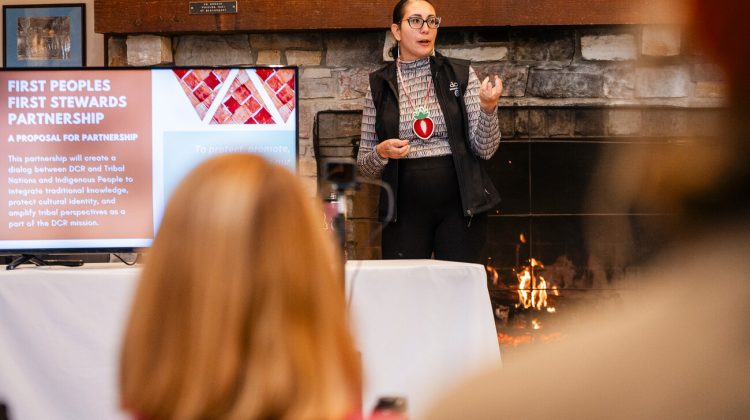SAUGUS — Breakheart Reservations began its series of fireside chats today with a presentation from Leah Hopkins, the Massachusetts Department of Conservation and Recreation’s first Indigenous peoples partnership coordinator.
This is the first installment this year of several planned fireside chats, which will involve conversations with DCR’s experts about the work they are doing within the agency and its connection to Breakheart.
Hopkins is a member of the Narragansett Nation in Rhode Island, where she grew up. She traces her place of origin to what is traditionally called Quonset, also known as North Kingstown.
Hopkins became the coordinator for the First People First Stewards Partnership Program in Nov. 2024. She got her start working in museums with Tribal Nations, and she has her own consulting business specializing in Indigenous New England history, culture, educational initiative and language for 20 years.
“It’s been wonderful being here, and I definitely acknowledge all of the work that has gone into creating my department, creating my position, and the people who have been doing this very important but also delicate work of tribal engagement before me,” she said.
She added that while museums can be stagnant at times, this is an opportunity for growth where she is looking at working with and being a part of changing narratives. Doing so helps change policy and ideas to help Indigenous communities in southern New England.
Hopkins explained that her father, Don Eagle Hopkins Sr., had a major influence on her growing up. He was Narragansett, a system practitioner, cabinet maker, knowledge keeper, and culture bearer.
“I started being on the land, being in community, from birth, from when I could walk, when I could dance, when I could participate, when I could sing,” she said. She continued that she learned a lot about who she was as a Narragansett person through him.
“My father was also an activist when it came to Indigenous rights, particularly fishing rights in Rhode Island, and these are still conversations that are being held today,” she said.
Hopkins began her job with the knowledge to share with the DCR as well as needs that she can anticipate that the Native community has in terms of establishing connections and relationships with the lands under DCR stewardship.
“The First People First Stewards Partnership Program predates me,” she said. “I am just this new iteration of it, and it has come out of these different departments here at DCR.”
These programs include design and engineering, natural resources, cultural resources, interpretive services, forest stewardship, external affairs, land protection, park operations, water supply protection and ranger services.
“Native studies, or Indigenous Studies, is automatically interdisciplinary. It is the intersection of history…colonial studies…archeology and anthropology. It’s of biology and climate science and public history,” Hopkins said. “So, it’s not surprising that the First People First Stewards Partnership is the intersection of all of these departments, because native people are represented by interpretive services.”
The point of the program is to infuse Indigenous knowledge and Indigenous people throughout all of the different departments within the agency, according to Hopkins.
“The proposal for partnership is to establish, or further a dialog that exists, or will exist between DCR and tribal nations and indigenous communities,” she said.
It will integrate traditional knowledge while also protecting cultural identity. This will help the DCR protect, promote, and enhance the Commonwealth of natural, cultural, and recreational resources for the well-being of all, according to Hopkins.
“DCR worked to conserve and protect these lands and waters and forests by integrating science, research, and technical assistance and experts into the management of these natural resources,” she said. Hopkins explained that she didn’t like the word management because, from hers and the Indigenous perspective, it isn’t actually management.
“You can’t go out and manage the land,” she said. “The land is its own being, and it’s been here before you, and it’s going to be here after you…Instead of management, it’s about being in relation with the land.”
She continued that every single square inch of Massachusetts is a traditional property, and that’s how Indigenous people view it.
“These are Indigenous homelands where people have planted and fished, gathered, grown, conducted ceremony, conducted diplomacy, created policy, worked with the land, had relationships with one another, had relationships with all the beings in creation,” she said.
Hopkins explained that Native people have been on the land for over 12,000 years, and there are stories that go back to the glaciers and the way that the land was formed.
“These stories exist,” she said. “When we can work together, we can come to understand just how significant this is to Indigenous people and help to make space for them to tell their own stories.”
Hopkins’ work will include connecting indigenous people with the DCR to create a dialogue between the two groups, with her as the one guiding the process.

